Renowned feminist-economist Padma Bhushan Devaki Jain was in Mysuru on a private visit last weekend. She is the daughter of M.A. Sreenivasan, who was Minister in the Princely State of Mysore. He was a Member of the Constituent Assembly representing the Princely State of Gwalior during 1947-48.
He had an illustrious career in the Civil Service in the then State of Mysore headed by Krishnaraja Wadiyar IV, commencing from 1918. He also served as Mysore’s Trade Commissioner in London.
Born in 1933, Devaki Jain grew up in Mysore and Bangalore. She graduated from Mount Carmel College in Bangalore in 1953, with special papers in mathematics and economics. She was awarded three gold medals by University of Mysore (UoM). The College came under UoM then.
Hailing from an influential Tamil Brahmin family, Devaki married Gandhian activist Lakshmi Chand Jain and had the good fortune of meeting various national and international leaders and scholars who immensely impacted her life including Jayaprakash Narayan, Vinoba Bhave, Nelson Mandela, Desmond Tutu, Amartya Sen and Kamaladevi Chattopadhyay.
A scholar of repute in economics, she has done pioneering work in giving shape to the women’s movement in India, particularly at the grassroots level. She is involved in various initiatives and institutions that have done remarkable work in recognising gender inequalities and formulated policies to address the imbalance.
Devaki Jain was awarded Padma Bhushan in 2006 in recognition of her contributions. Sreenivasan Jain of NDTV-fame is one of her two sons and she had come to Mysuru with him. In Mysuru, she was put up at Hotel Metropole where she interacted with Mysuru Literary Forum Charitable Trust members. Devaki Jain spoke to Star of Mysore about her affinity to Mysuru and her memoir ‘The Brass Notebook’ that has now been translated into Kannada apart from being translated in Marathi, Hindi, Tamil and Malayalam. Excerpts:
By B.C. Thimmaiah
Star of Mysore (SOM): What is the purpose of your Mysuru visit?
Devaki Jain: We were going to Thirunarayanapuram (Melukote), which is the source of my family — my great grandfather was from here. My brother M.S. Rajan built the Sanskrit Academy in Melukote and also a library. We wanted to see his contributions. We also have great emotional bonding with Melukote — our home and Saint Ramanujacharya, so on and so forth. My maternal grandfather had a career here.
SOM: Your father conceptualised Dhobi Ghats and Agraharas (low-cost houses) of Mysore.
Devaki Jain: My father was a great doer and I am proud to be his daughter. In fact one of the publishers in New Delhi is republishing my father’s memoirs “Of the Raj, Maharajas and Me” and I want to finance its Kannada translation as I think people of Karnataka should read it.
SOM: What are your memories of Mysore?
Devaki Jain: I have written this in my memoirs where I remember my father was the President of the Mysore City Municipal Council. We lived in a house called ‘Bombay House’ on the fringe of the arch which leads to a park and then to the Mysore Palace. I remember my father riding a horse in the mornings for his inspections. When the horse would come and as a treat for me — I was four years old then — my father used to take me on the horse for a ride till the park and I used to get off and he would continue.
For me, the horse and the Palace were special as we used to go to the Palace for every event. Now we went to the Palace and saw it from outside. I remember my mother dressing up for the Dasara Durbar. The other thing I remember is that we used to go by tongas to the school. These are very happy memories. I went to the Devaraja Market last weekend and it looked just the same as when I was a child where my mother used to buy vegetables.
SOM: Give us a glimpse about your father’s personality?
Devaki Jain: He was unusually brilliant. We talk of brilliant people like Ramanuja the mathematician — something beyond the normal. He was not just an administrator but he was the one who revived the game sanctuary near Mysore. He was a multifaceted personality and used to strive for the betterment of the society.
His heart was with workers and wherever he visited as part of his assignments, he used to ensure that he did something for the workers. He was constructive at every step and had an immensely creative mind when it came to development.
M.S. Subbulakshmi came to sing in the Palace for the Yuvaraja many years ago and my father was there as President of the Mysore City Municipal Council. He invited her home to meet his mother and Subbulakshmi sang for her. She was only 19 or 20 then. She became a good friend of the family and she used to meet my father even when he was 100 years old. I became her friend and I used to go to Chennai to stay with her. My father loved music and dancing. He was a rasika and a multi-faceted man.
SOM: How often do you visit Mysuru?
Devaki Jain: I would love to visit more but I have not visited here often, the last was nearly 10 years ago. Mysore means a lot to me and is close to my heart though I don’t visit often. I am happy to tell you that my book ‘The Brass Notebook’ has been translated into Kannada and titled ‘Hithaale Bannada Pustaka, Devaki Jain Badukina Putagalu’. It has been translated by Kodibettu Rajalakshmi and she tells me that the response for the translation is very good.
Interaction with Mysuru Book Clubs
Mysuru Book Clubs in association with ‘Speaking Tiger Books’ — one of India’s most acclaimed independent publishing companies — had recently organised an online talk with Devaki Jain on her book ‘The Brass Notebook.’
At Hotel Metropole, where Devaki Jain was put up during her private visit to Mysuru, she interacted with the stakeholders of Mysuru Literary Forum Charitable Trust where she spoke at length about her experiences and her book, a conversation interspersed with humour.
M.A. Sreenivasan: A champion of low-cost housing
Mandyam A. Sreenivasan, father of Devaki Jain, occupied many posts in the princely State of Mysore, including the posts of President of the Mysore City Municipal (MCM) Council and Chairman of the City Improvement Trust Board (CITB), the present Mysore Urban Development Authority (MUDA).
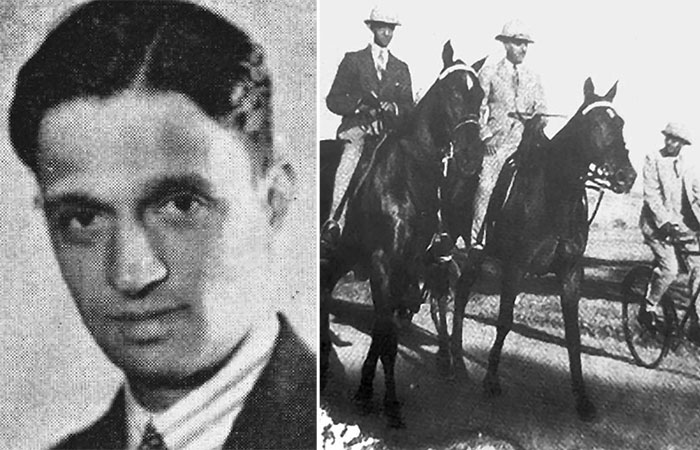
Apart from conceptualising Mysuru’s Dhobi Ghat (on the lines of Bhojana Shalas of the Hampi ruins), he championed the cause of building low-cost model houses, drawing inspiration from the old concept of Agraharas to serve as models for a comprehensive rehousing and housing scheme for Mysore.
M.A. Sreenivasan built low-cost model houses for the poor. These houses were built around an open quadrangle adjoining the Karohatti Road, now called Ramanuja Road, in 1936. The houses were given on nominal rent, enabling the allottee to become owner at the end of 20 years.
This locality was inaugurated in 1938 by Yuvaraja Kanteerava Narasaraja Wadiyar and was named ‘Sreenivasan Agrahara’ in recognition of M.A. Sreenivasan’s dedicated service to the city.
‘My son grew into a journalist by himself’
Devaki Jain has two sons — Gopal Jain, Senior Supreme Court Advocate and Sreenivasan Jain, Group Editor of NDTV. He has reported and anchored award-winning ground reports and investigative shows.
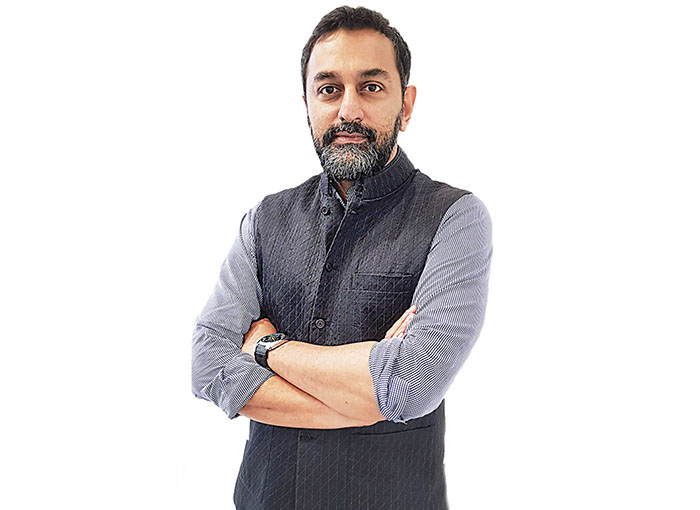
When asked about her son Sreenivasan Jain being a popular TV personality, Devaki Jain says, “These are not the things we arranged. Vasu (Sreenivasan Jain) grew into a journalist by himself. And he is a very modest fellow like his father and not a show-off at all and that is the more important thing for us. I am so happy that Vasu is warm and friendly.”
“The skill of being on the TV show, I think, he inherited. Sometimes there are things that come genetically and sometimes through behavioural observations. Vasu’s paternal grandfather was editing one of the most famous newspapers in Delhi during the freedom struggle and it was called ‘Arjun’. He was the editor and writer of repute. In fact, both sides of Vasu’s family — my father’s father and Vasu’s father’s father — were into writing and publishing journals. I think it is a genetic gift,” she said.
When asked about Sreenivasan Jain’s upbringing, Devaki Jain said, “Fortunately for us, we did not have the money when he was growing up and he did not get into this lavish lifestyle. He was brought up with school clothing of others, handed down. So my sons know what it is like not being affluent and privileged. And that’s what adds to Vasu’s credibility that he is not feeling like a rich boy. I am so glad that people appreciate him and he is very sincere about his work.”



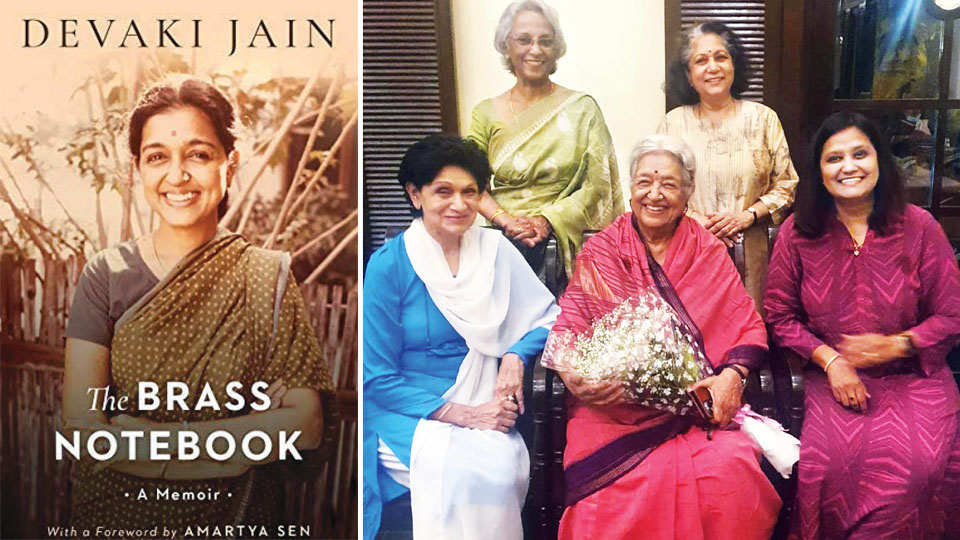

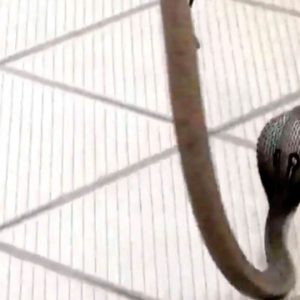
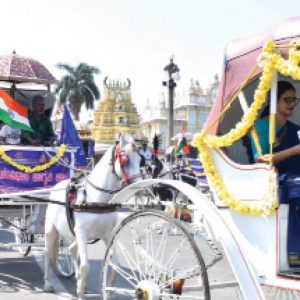
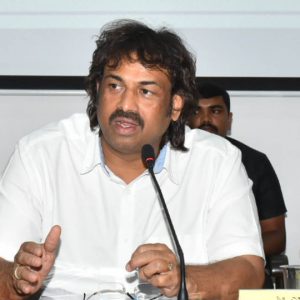
@ This locality was inaugurated in 1938 by Yuvaraja Kanteerava Narasaraja Wadiyar and was named ‘Sreenivasan Agrahara’ in recognition of M.A. Sreenivasan’s dedicated service to the city.,,,,
Kanteerava Narasimharaja Wadiyar … He inaugurated the THE MODEL HOUSES FOR THE POOR ON KAROHATTY ROAD, ON . APRIL
1ST, 1938………It is thirteen years ago now since His Highness the Maharaja and I realised the necessity for taking action in this important matter, and each of us made a donation of Rs. 10,000 to establish a fund for the erection of houses for the poorer classes…..I am particularly glad to see that the scheme embraces, not only the housing of mankind within the City, but also the housing of cattle without it, in scientifically designed Gowshalas…..
The rows of match box size houses in Srinivasa Agrahara, in the Ane Karoti road, now Ramanuja Road, was hardly of enough size for a family to live in. Supposedly for those who were not rich, no one knew how a house was given to a family.
So her father was as brilliant as the mathematics genius Srininvasa Ranajuan? What nonsense . That line itself shatters her credibility.
So her father was as brilliant as the mathematics genius Srininvasa Ranajuan? What nonsense . That line itself shatters her credibility.
As for this Srinivasan Agrahara, these very small houses, hardly enough space to move . In those days houses were not expensive to construct, as the neighbourhood of this Agrahara demonstrated.
So she Government of India, for her contribution to social justice and the empowerment of women., awarded Padmas Bhushan. Yet, in her own state, Karnataka, and the city in which she lives-Bangalore, young married women are badly treated, many are even murdered for not having met the dowry money! Well, there goes her service!
She also worked i Julius Nyerere commission. This Nyerere was an absolute dictator in Tanzania,his elections were a sham. Typical UN commission, headed by this dictator.
So this Devaki Jain, finds it difficult to visit Mysore , living in Bangalore, a mere 90 miles, with these days well-connected by broad gauge yrains, and highway,
Her international experience in the Wiki is bloated-just like that of the FM Mrs Sitharaman.
She exaggerates her life with her husband Jain, with claims of poverty,. These Jains from Gujarat were rich , and took on political activism, as a hobby.
Sorry a correction: I should have realised that her husband jain was none other than the very controversial LC Jain , the ambassador to South Africa, a strong supporter of the Congress, and no wonder his wife, this Devaki Jain was included in that socialist dictator Julius Nyerere’s commission,
“Devaki Jain said, “Fortunately for us, we did not have the money when he was growing up and he did not get into this lavish lifestyle. He was brought up with school clothing of others, handed down. So my sons know what it is like not being affluent and privileged.”
The above , I find unbelievable, as her husband hailed from a well to do family from Rajasthan, and by the time she married him, he was well established in the cooperative movement, and was not short of money as she claims. No one like him who were associated with Congress so closely, were poor!
Not clear why this woman was invited to Mysore and feted in Metropole Hotel, , out of amny Indian 0style hotels in Mysore.
I look at her so called achievements, as the outcomes of marrying to a politically active and staunch-Congress Party-supporting husband. He was rewarded for his Congress Party support with many positions in New Delhi ,ending as Indian ambassador in South Africa- the gift for his work for the Congress Party. It is interesting that women like this Devaki Jain who boast as feminists and contributors to women liberation in India, were married to powerful men! She was not a poor girl emerging from the Koppal in Mysore ,educated at Oxford and achieved what she did by herself!
Born to a rich family in Melkote-a citadel of narrow-minded caste 0based cesspit that a particular caste had made it Even to day, that Temple in Melkote practices, awful casteism.
Studying at Oxford, thanks to be born to a rich father, who hailed from the above Melkote, and who was an obedient servant of the British Raj, does not sound to me as an achievement for a woman, born to privilege. Nor does an undergraduate degree at Oxford in PPE -politics, philosophy and economics, makes her an economist. She was able to do as that was reported in New Delhi and elsewhere in Africa including working in Julius Nyerere commission, not because of her independent stature as a woman achiever, but because, she was Married to LC Jain a staunch Congress Party member an supporter of successive Congress socialist governments at the centre. Julius Nyerere , a socialist leader and president of Tanzania , had one of the worst human rights records in Australia, subjugating his people, After her husband was disgraced under Vajpayee government on a controversial standing as the Indian Ambassador to SA, she lost all her influence, and hence moved to Bangalore.
Glamourising her as a feminist and a fighter for women causes , insults other women who are quietly doing the work, uplifting the women from misery through ground work and NOT merely writing books and presenting lectures like Devaki Jain.
About her father’s achievements. He was no Srinivasa Ramanujan, as she mentions, but a second grade ICS officer-not the DC at that time, who were English and very powerful. His achievement was to construct a series of rabbit holes for housing-called Srinivasan Agrahara. Each house was pathetically small, where women had no privacy.
If the SOM wants to celebrate the international women year, it should seek out women who really work at the society level opposing the evil practices such as dowry which leads to murders of young married women . They will not be Oxford-educated, married to politically powerful men, nor they will have time to write to write books and lecture. They will be quietly working as unsung heroes.
M.S. Subbulakshmi came to sing in the Palace for the Yuvaraja many years ago and my father was there as President of the Mysore City Municipal Council. He invited her home to meet his mother and Subbulakshmi sang for her. She was only 19 or 20 then. She became a good friend of the family and she used to meet my father even when he was 100 years old. I became her friend and I used to go to Chennai to stay with her. My father loved music and dancing. He was a rasika and a multi-faceted man”
No dates are given to check the veracity of Devika Jain’s story , which is full of holes. The SOM seemed to have been very impressed with her credentials, and for this story, the SOM put her up in the Metropole Hotel? Asa poster above suggested an undergraduate degree in Economics which was one of her subjects, not the main one , did not make her a renowned economist, although with her husband’s political influence (Cingress Party) she did created an institute in New Delhi, wrote her books, giving lectures too without putting hard work in at the volunteer level to know more about women’s struggle in the Indian society. Just an arm chair feminist getting leverage from her husband’s political connections.
Now, about the above MS Subbulakshmi story. At 19/20, she was not known known much outside Tamil Nadu. Indeed at that age, she was getting to be well versed in Carnatic Music in Madurai. The Yuvaraja in question was not known for his artistic taste unlike his elder brother the Nalwadi. He was more known for his womanising and ‘sowing wild oats’ which he surely did! MS Subbulakshmi’s husband Sadasivam, was very selective in regards to his circle of friends, and how did Devika Jain’s father befriended him to the extent that her family were staying in Sadasivam’s house on visits? What was the year? Did she attend the funeral of MS Subbulakshmi or even went to see her daughter ( stepdaughter), Radha Viswanathan, who moved to Bangalore after Ms Subbulakshmi’s death? These questions needed to be asked to check the veracity of this woman’s story.
What is clear is the SOM’s poor quality journalism. There are other Women in India, who are real achievers through their own merit-a few are in science and medicine too,. The conversation then would have been meaningful.
I agree with the above posters who have articulated well. I am very wary of so called feminists who fight for the emancipation of women, through books and lectures, and not spending a single day with toiling women , be it agricultural fields or as cleaners for a pittance or as young women subjected to abuses by their husbands for reasons of not bringing in enough dowry cash.
About Devaki Jain’s husband, L C Jain, the Congress Party’s so called volunteer, who used his credentials as independence fighter, to milk ‘the ‘ payback’ to gain positions under the Congress rule at the Centre. He managed to become a diplomat and got the plum position as ambassador of South Africa. But when Vajpayee ‘s government conducted the first atomic explosion, he vocally opposed it giving statements in South Africa, when as an ambassador of his country, his job as a diplomat was to support his government’s policy, although he was an appointee of the previous Congress government. South Africa itself at that time, in the post-apartheid transition, was toying with an experimental nuclear explosion, planned by the previous government, as it was not sure the extent of its survival.
L C Jain was prattling his opposition to India becoming a nuclear power, while remaining as an ambassador, enjoying his perks with his wife-this Devika, not resigning his position as a matter of principle. At that time, I remember, this created a wave of controversy , and was the most-talked about topic in Mumbai. L C Jain knew his stance would further strengthen his position in the Congress Party which opposed this nuclear explosion at that time. The Congress leaders knew that they in their long years of power at the centre missed this opportunity, and were very envious of what Vajpayee did.
LCJain came back from South Africa, and was feted naturally by his Congress bosses, and his wife Devika Jain was able to use it for her purpose, when Congress formed the government at the Centre again. So much about her credential as a feminist and fighter for women’s causes!!
I agree with the above posters who have articulated well. I am very wary of so called feminists who fight for the emancipation of women, through books and lectures, and not spending a single day with toiling women , be it agricultural fields or as cleaners for a pittance or as young women subjected to abuses by their husbands for reasons of not bringing in enough dowry cash.
About Devaki Jain’s husband, L C Jain, the Congress Party’s so called volunteer, who used his credentials as independence fighter, to milk ‘the ‘ payback’ to gain positions under the Congress rule at the Centre. He managed to become a diplomat and got the plum position as ambassador of South Africa. But when Vajpayee ‘s government conducted the first atomic explosion, he vocally opposed it giving statements in South Africa, when as an ambassador of his country, his job as a diplomat was to support his government’s policy, although he was an appointee of the previous Congress government. South Africa itself at that time, in the post-apartheid transition, was toying with an experimental nuclear explosion, planned by the previous government, as it was not sure the extent of its survival.
L C Jain was prattling his opposition to India becoming a nuclear power, while remaining as an ambassador, enjoying his perks with his wife-this Devika, not resigning his position as a matter of principle. At that time, I remember, this created a wave of controversy , and was the most-talked about topic in Mumbai. L C Jain knew his stance would further strengthen his position in the Congress Party which opposed this nuclear explosion at that time. The Congress leaders knew that they in their long years of power at the centre missed this opportunity, and were very envious of what Vajpayee did.
LCJain came back from South Africa, and was feted naturally by his Congress bosses, and his wife Devika Jain was able to use it for her purpose, when Congress formed the government at the Centre again. So much about her credential as a feminist and fighter for women’s causes!!
I read Devaki Jain’s answers, and expected her father Srinivasan’s strong links to Nalwadi Krishnaraja Wadiyar. Nalwadi never missed to spot a talent. Mr Srinivasan , an ICS officer occupying administrative positions in Mysore, and his abilities narrated by his daughter, he would have surely come to the attention of Nalwadi. Instead, Devika Jain mentions this links with Yuvaraja . Kanteerava Narasimharaja Wadiyar.
Why . Kanteerava Narasimharaja Wadiyar and not his elder brother Nalwdi he Maharaja?
Very little is known about Kanteerava Narasimharaja Wadiyar. Granting that his illustrious elder brother excelled him, and that he was the father of JC Wadiyar who succeeded Nalwadi. Stories abound about him, and the serious ones were about his travels and death in Bombay.
Of course, her husband was well known for his controversies!
Is this the best The SOM can do?
I am amazed at so much of digging and mudslinging. Hope these researchers will do some constructive work to better the lives of common citizen.
Jai Hind
These mud slinging posts by the moron chairs reminds me of an old saying- pearls before swine.
Great article,and the lady and her family have done more for the commoner than these idiots who need to get a life.
There are some dim witted suckers like @Viresh around, in India, where lies are dressed up in biographical account as truths.
Not even an idiot uses a twine to string real pearls together. Glass pearls shine, but is easy to see them as fakes with the twine holding together!